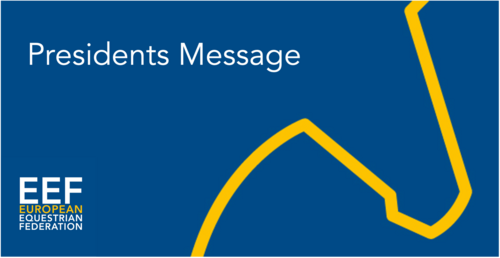Time for action: National Federations will lead the way
04. Jul 2023 / Category: News
Looking at the situation of the equestrian society then it is clear that National federations control almost entirely the sport. The FEI makes the rules and regulations for international competitions; however, it is the NF’s that communicate and enforce these rules with the riders and the communities in each country.
In itself, this is a good example of the pyramid system of sports governance at work. However, it also has some disadvantages, as we now can see with the introduction of a strategy to become a sustainable sport.
The FEI has appointed a commission to look into horse welfare, which is only a part of sustainability, which should prepare recommendations for the FEI to ensure that the FEI, or better said the equestrian sport, will obtain a Social License to operate.
At the FEI sports forum earlier this year, the commission presented a list of recommendations. The recommendations are all based on the outcome of a survey that the commission carried out and are aimed at maintaining the acceptability of equestrian sport.
The survey targeted both people who have experience with horses and people without any or very limited experience with horses and produced a clear outcome. A majority is still in favour that we can do sport with horses, however, they have concerns about horse welfare and safety for the horses. This is vital information. It means that we cannot continue exactly as we are and only when the concerns raised are addressed by the sport itself, will we be able to increase and maintain a majority that is in support of our sport.
Following a review of the survey, 24 recommendations have been made. This is all supported and based on scientific research. It is clear that certain recommendations can be implemented immediately, and others need more time. Some will require real fundamental change, and maybe even legal support. This includes recommendations to ensure welfare out of competition, which may require rights to access stables or perform checks.
The survey results showed that people with horse experience are actually more concerned about the welfare of the horses, the tack and equipment, the training methods and so on, outside competition. So working towards ways to safeguard horses at home is a key focus.
While steps like this will require more time, there are many recommendations that can be actioned now. As of today, National Federations represent some 96-98% of all equestrianism. The influence these NFs have is huge and means they have one of the most important roles to play in obtaining a social license for the sport in their respective countries.
The recommendations in this list are ready to be used now. There is no need for European NFs to wait for the FEI to come up with proposals on which and when to implement some or all the recommendations. It is very well possible, even expected, that different NFs will implement different recommendations in a different timeframe, depending on the situation in their countries. They have not only the power to do this but also the responsibility to do it.
Additionally, it is possible that the FEI will not accept some of the recommendations where we, in Europe, feel that they are necessary to be implemented, as the opinion of society about equestrian sport in Europe can differ from the global FEI view.
In Europe, especially, more and more pressure is mounting on the equestrian community to improve and to make sure that the majority of society can stay positive about our sport. It is very encouraging that the British Equestrian Federation and the Irish Equestrian Federations have taken the decision to start writing their strategies regarding sustainability and will implement some of the recommendations, made by the commission, already.
The EEF understands that creating these strategies and prioritising recommendations takes time and resources from your federation. We will work to help you and provide assistance where possible to help you adopt a sustainability strategy.
Horse welfare is only a part, of the strategy for the equine society to become a sustainable sport and continuing to educate and raise awareness of the environmental, and human issues facing our sport in Europe is also high on the EEF’s agenda.
To have a social licence is not only something invented for the equestrian sport but for all industries and organizations and is a result of the change in standards and values of our community. Those changes are partly influenced by climate change, loss in biodiversity, CO2 emissions etc, and the rapid rise in the environmental decline is causing public opinions to change quickly and with strong intent.
I know that these issues that need to be addressed are also very difficult to address. Finding the right answers, and the right tools to make change is not easy and the EEF will use everything in its possibilities to support the members to find answers, solutions and safeguard our sport.



